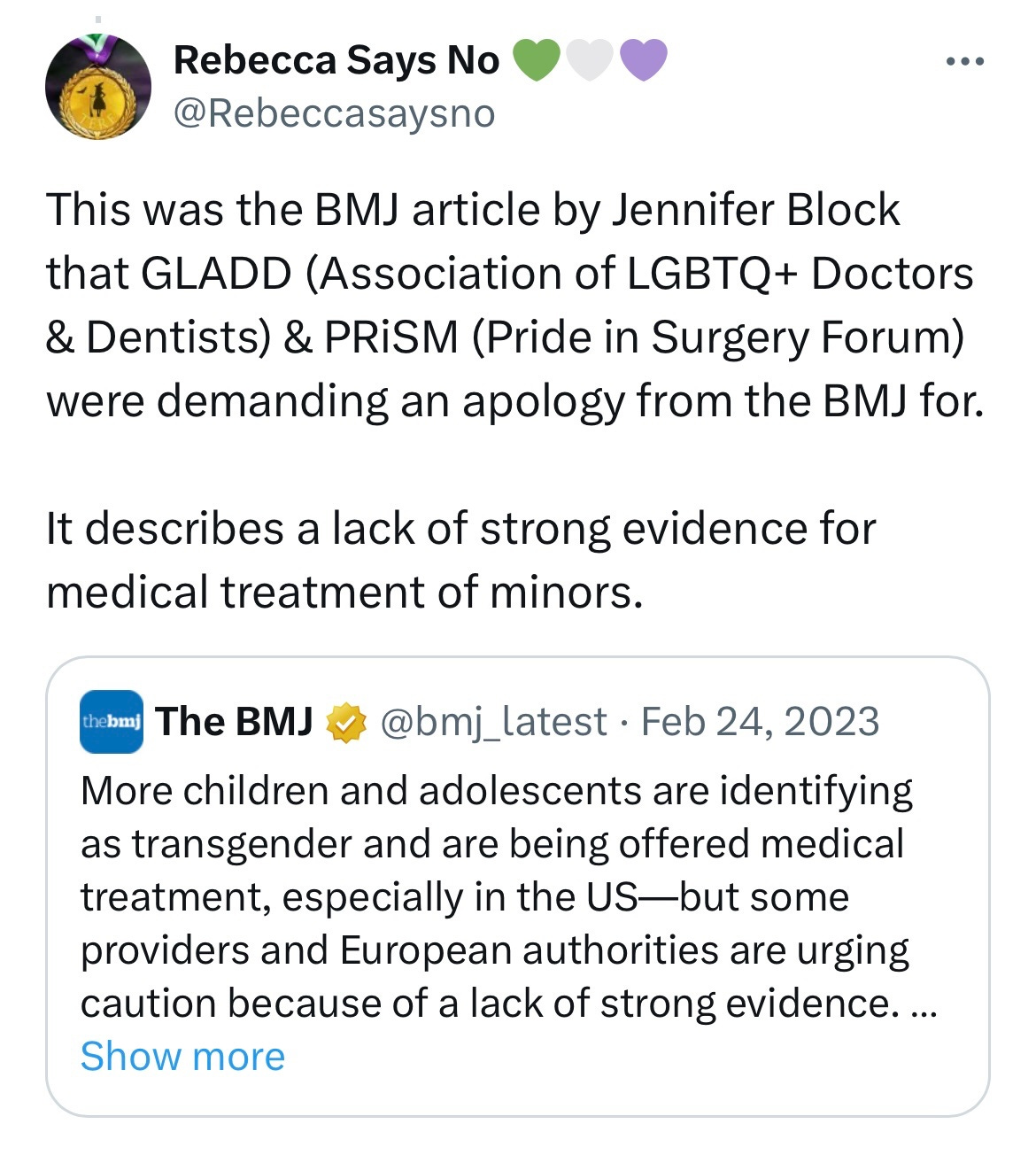Ideological Capture in the British Medical Association
Doctors’ Union The BMA Instigates Council Vote to ‘Disavow’ Cass Review: Gender Activist Doctors Led By Emotions and Zealotry
In an extraordinary step, the British Medical Association announced that on Wednesday 17th July its council would vote on their motion to ‘disavow’ the Cass Review, despite it being an evidence-based report that was conducted over four years. However, this reactionary behaviour is not unexpected from the BMA and other prominent groups in UK medicine around the topic of gender.
In February 2023, Jennifer Block’s article Gender dysphoria in young people is rising—and so is professional disagreement urged caution due to the lack of strong evidence for gender treatment in minors. This provoked furious responses from many activist doctor groups including the BMA, GLADD UK (Association of LGBTQ+ Doctors and Dentists) and PRiSM (Pride in Surgery Forum, subgroup of the Royal College of Surgeons), who went as far as trying to have the article removed.
In a joint letter sent to the British Medical Journal in March 2023, GLADD and PRiSM demanded that the publication not only remove Jennifer Block’s article, but also apologise for publishing it. Dr Joseph Hartland of GLADD commented: “Fantastic to see queer leaders in medicine taking a stand. Incredible that in the face of this critique, the BMJ will not recognise the problems with this article”. He went on to describe the article as being ‘steeped in poorly informed transphobia’. These complaints seem intended to try to reinstate the outdated trans-activist approach of ‘no debate’ being allowed in this area. However, the safety of patients depends upon open discussion between medics no longer being suppressed.
Thankfully, the British Medical Journal refused to capitulate to these gender activist doctors’ attempts at censorship. The Editor-in-Chief of the BMJ, Dr Kamran Abbasi, responded clearly: “For the avoidance of doubt, we do not agree with your criticisms of the article and we will not be apologising. We do not accept your accusations of undeclared ideological interests. It is important that young people receive care in line with a rigorous assessment of the evidence. That’s our only interest. We hope that is something you can agree with us on”.
Unfortunately, considering that GLADD UK wrote to the high court in January 2021 expressing concerns that their restriction of puberty blockers would ‘worsen trans healthcare’, any agreement in this area seems unlikely. “We, the executive committee of GLADD, have profound concerns about the High Court’s judgement that children under 16 are unlikely to be able to consent to puberty blockers. As a community of LGBTQ+ clinicians, we have personal and professional apprehension for the young trans people of this country”.
The constant invocation of their own so-called lived experience above all else denotes these doctors as activists first and foremost. Indeed, GLADD’s affirmation-only medical schools charter (signed by 80% of UK medical schools) is described on its front page as being ‘created by queer medical activists’.
In terms of the BMA, Dr Emma Runswick (BMA Council’s Deputy Chair) complained that the British Medical Journal’s article ‘[lacked] Equality, Diversity and Inclusion awareness and patient voice’. Dr Runswick also reacted to Wes Streeting’s recent decision to make the ban on puberty blockers permanent by lamenting ‘This is a terrible political decision, which will cause incredible harm to trans people. Prescribing decisions should be for clinicians with patients (and families), not politicians. The ban should be reversed.’ Dr Runswick went on to state “Puberty blockers are not irreversible. They pause puberty. When a person stops taking them, puberty starts again”. This does not seem to be a perspective that acknowledges the harms done by puberty blockers. It again only approaches the topic from an ideological stance, in which affirmation of ‘gender identity’ must be prioritised at all costs.
Another interesting aspect of the BMA’s staff is that Dr Laura Russell, the Head of Regulation, Education and Training worked for Stonewall from 2018-2020. This also indicates a conflict of interest that could imply bias when approaching the topic of gender in medicine.
It is also worth remembering that the BMA has been campaigning to ban so-called ‘conversion therapy for gender identity’ for quite some time. Dr Tom Dolphin and Dr John Chisholm were featured in a Pink News article campaigning for this in July 2020. They were, respectively, a BMA council member and Chair of the BMA medical ethics committee.
Many may also not realise that in September 2020, the BMA lobbied the government for trans-identified males to be accommodated in female-only hospital wards. It is doubtful that the BMA canvassed all medics signed up to the doctors’ union before deciding to campaign for this on their behalf, of course. Similarly, without allowing the full BMA membership to vote on the issue (rather than only the council), how can the doctors’ union possibly represent their members in their proposed decision to reject the Cass review?
The caution that Jennifer Block urged around gender treatment for children has recently been further vindicated following the Cass Review’s findings that they were not safe and are likely to carry more risks than benefits to patients. Health Secretary Wes Streeting based his recent decision to ban puberty blockers permanently in the UK on these findings, stating that he would be led by the evidence and act in the interests of children’s safety.
So why would gender activist doctors refuse to do so, insisting on their narrow view of the world in which their far-fetched gender beliefs are paramount despite all of the evidence to the contrary? Not only this, but insisting on trying to censor other doctors and bring back ‘no debate’ on the subject?
It does seem that these gender ideologue doctors are activists who are led by their emotions around social justice causes rather than the evidence. This is dangerous for patients and undermines the public’s trust in the medical profession.







